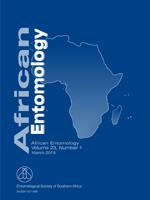Two adult food supplements, namely 10 % solutions of honey and sugar, were tested to evaluate the reproductive potential of the pteromalid parasitoid, Dinarmus basalis, on Callosobruchus chinensis (L.). Distilled water was fed as untreated control. The highest adult longevity was found when fed with 10 % honey solution (male 19.3 ± 0.68, female 27.9 ± 0.81 days) while the lowest was recorded when fed with distilled water (male 14.4±0.80, female 19.7±0.57 days). Females produced overall 143.6±0.52, 184.8±0.54 and 211.35±0.57 offspring when fed with water, sugar and honey, respectively. The total fecundities were 194.3±0.60, 245.85±0.63 and 273.9±0.66 per female when fed with water, sugar and honey, respectively. Time of development of the parasitoid was faster when females were fed with honey as compared to other food supplements. Sex ratios indicated that the parasitoid produced female-biased progenies. Dinarmus basalis produced progeny throughout their life sequentially and therefore it is synovigenic. The honey-fed female parasitoids showed the best performance with increased fecundity and longevity over the other food supplement.
How to translate text using browser tools
1 March 2015
Influence of Food Supplements on the Reproductive Potential of the Parasitoid, Dinarmus basalis (Rondani) (Hymenoptera: Pteromalidae) on Callosobruchus chinensis (L.) (Coleoptera: Bruchidae)
M.A. Hossain,
M.A. Haque
ACCESS THE FULL ARTICLE
It is not available for individual sale.
This article is only available to subscribers.
It is not available for individual sale.
It is not available for individual sale.

African Entomology
Vol. 23 • No. 1
March 2015
Vol. 23 • No. 1
March 2015
Callosobruchus chinensis
Dinarmus basalis
food
reproductive potential




